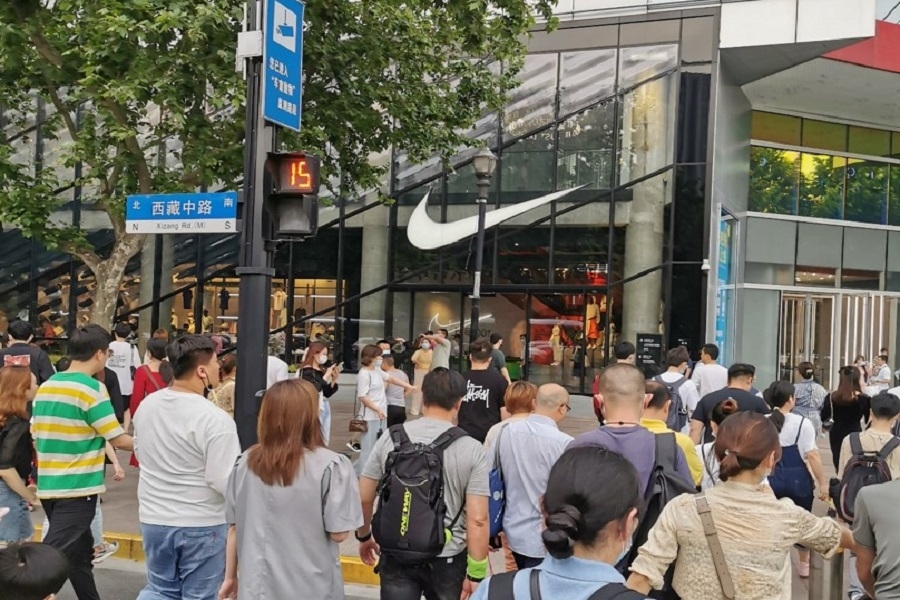On Tuesday morning,
hundreds of QAnon followers gathered on the grassy knoll in Dealey Plaza in downtown Dallas, believing they were going to see John F. Kennedy reappear.
These people had traveled from all over the U.S.—from California, Florida, New York, Montana, and at least a dozen other states. On Monday night there was an almost carnival-like atmosphere in downtown Dallas, as they gathered in anticipation of the predicted return of the assassinated president, something they believed would also somehow trigger the return of former president Donald Trump to the White House and his announcement as “king of kings.”
But by early Tuesday afternoon, that sense of anticipation was fast disappearing, and as heavy rains started to fall, the people who had spent a lot of time and money traveling to Dallas to see JFK gave up and trudged back to their hotels.
But for many, the cost and effort it took to get to Dallas were not wasted, because even though they didn’t see JFK, many of them did get to meet the man they view as the manifestation of God on earth.
Michael Brian Protzman, 58, who his tens of thousands of loyal and obsessive followers know as Negative48, showed up in Dallas to see the prediction he’d made come true.
Protzman, born in the same year Kennedy was shot, has run his own demolition firm, called Eclipse Demolition, for the last 14 years from his hometown of Federal Way, Washington. Records show that the company went into administration last year, around the same time that Protzman was beginning a new career as a QAnon influencer.
But unlike most influencers, Protzman has effectively built a cult within the QAnon movement, where his followers refer to him as a godlike figure, are willing to travel across the country to see JFK resurrected, and most of all, continue to praise Protzman even when the miracle fails to materialize.
His rise within the QAnon world has been rapid. Back in March, his Negative48 Telegram channel had around 1,700 members; today, it has over 105,000 members. But aside from the number of followers Protzman has, what makes him stand out from other QAnon influencers is the loyalty and worship he has engendered in those people.
Protzman has used his newfound fame to spread deeply antisemitic content while pushing highly suspect financial investments to his followers, many of whom confessed within the channel that they are in vulnerable situations personally and are in need of help.
As well as denying the Holocaust, Protzman’s channel has boosted
the deeply antisemitic film Europa – the Last Battle, a 10-part film that claims Jews created Communism and deliberately started both world wars as part of a plot to found Israel by provoking the innocent Nazis, who were only defending themselves.
“If you haven’t watched the documentary Europa: The Last Battle 2017, here’s the link,” said the post, sent on Oct. 2. It has been viewed over 38,000 times.
He has also promoted the film
Adolf Hitler: The Greatest Story Never Told and said that if Trump had done what was needed, he would have been compared to the Nazi leader.
Protzman attempts to hide his hatred of Jews by discussing conspiracies related to the Khazars,
an antisemitic dog whistle that’s been used by conspiracy theorists for centuries.
But in an audio chat in May, Protzman declared to his followers that “there are no Jews. Period. Anywhere. Period. There is no Jewish race. And the Jewish leadership are basically the British empire, the Roman empire, it’s just the criminals.”
Like many grifters, Protzman is pushing questionable financial advice to his followers. In this case it involves investing in foreign currencies like the Iraqi dinar or the Vietnamese dong, under the pretense that a “great financial reset” is coming and will revalue those currencies on a 1-to-1 basis with the dollar, instantly creating millions of dollars in wealth for those who have invested.
While Protzman tells followers they can buy the currency anywhere, he says that the best way to do it is by signing up on a website he promotes where users have to sign a non-disclosure agreement before making their purchase, an agreement which he said on an audio chat in May that forbids them from discussing the details of the transaction.
“The stuff that I have seen has shaken me to my core,” one researcher who has been tracking Protzman’s activity for months told VICE News. The researcher,
who tweets at the Exposing Extremism account, was granted anonymity to protect himself from attacks by Protzman or his acolytes. ”They are brainwashing people with English gematria.”
Protzman’s popularity is built on a bastardized version of numerology known as gematria, a Jewish system of assigning a numerical value to a name, word, or phrase based on the letters used and inferring some sort of spiritual or mystical meaning behind the phrase.
Protzman’s fake gematria is based on English (A=1 to Z=26) rather than Hebrew (Aleph=1 Taf=400)—a system Protzman appears to have
co-opted from a similar method developed by English occultist Aleister Crowley.
Protzman applies this fake version of gematria to passages of the Bible as well as QAnon phrases, freely mixing the two worlds to create a link between Christianity, QAnon, and the Kennedys.
Protzman uses this system as “proof” to support the complex and fantastical lies he has told his followers.
In Protzman’s telling, Jesus Christ married Mary Magdalene and had four children with her. This gave rise to a bloodline that went on to create many famous people today, notably the Kennedys.
He also claims that blood-type O is a marker for the Christ bloodline and that the “New World Order” is trying to hunt down that bloodline by DNA testing COVID-19 PCR swabs.
In Protzman’s fantasy world, John F. Kennedy and Jackie Kennedy are the physical second incarnation of Jesus and Mary Magdalene, while JFK Jr. is the Archangel Michael, and Donald Trump is the Holy Spirit.
In videos captured of Protzman in Dallas this week, he is seen speaking as if in a trance channeling some higher source and taking words or phrases, assigning them numeric values, and then linking those phrases to other words and phrases with identical values—implying some sort of meaning in those connections.
When JFK failed to materialize in Dealey Plaza on Tuesday, Protzman and many of his followers went to a Rolling Stones concert, where many claimed they met Michael Jackson in disguise.
Protzman did not respond to multiple calls from VICE News to his cell phone, or to text messages, WhatsApp messages, or emails. Calls to a number listed for Protzman’s business went unanswered, while calls to a number listed for his residence was answered by someone who said “no one of [Protzman’s] name lives here.”
As outrageous and unhinged as Protzman’s claims may sound, he has clearly tapped into a demand for these messages.
While other similar groups on Telegram also pushed followers to travel to Dallas, their basis for doing so was Protzman’s predictions. And unlike other online conspiracy influencers, Protzman has so much sway over his followers that he was able to get them to travel from all corners of the country and show up in Dallas based solely on his word that a miracle was going to take place.
While many within the broader QAnon community blasted Protzman and his followers for making a mockery of the movement by staging such a stunt—
no, really—and despite the fact the Kennedys didn’t appear at Dealey Plaza, Protzman’s followers remain loyal.
In one group chat on a Telegram channel filled with followers of Protzman on Wednesday evening, one follower said: “I am so energized and feel amazingly positive about all of this.”
Another said: “I think Dallas was a great success,” adding, “I'm so proud of Negative and the people that went there.”

 en.wikipedia.org
en.wikipedia.org





